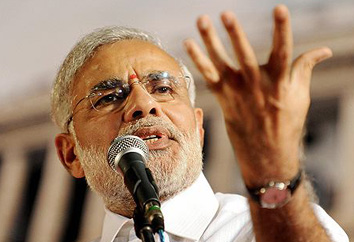New Delhi, Jan 28: Stepping up attack on Chief Minister Arvind Kejriwal, Union Home Minister Amit Shah on Monday dared the AAP chief to visit the anti-CAA protest site at Shaheen Bagh so that the people of Delhi can decide whom to vote for in the assembly election.
Addressing a rally in Rithala in northwest Delhi, Shah said Kejriwal and Congress leader Rahul Gandhi were against the construction of Ram temple, the scrapping of provisions of Article 370 and not bothered about the country's image and soldiers.
The opposition fears that they will upset their vote bank, he said and asked, "Are you their vote bank? Where is their vote bank?" To this, the crowd replied, "Shaheen Bagh".
The BJP leader claimed that the Delhi Police has booked Sharjeel Imam, a JNU student, on the charge of sedition for his comment of "trying to cut chicken's neck" and breaking the North East from the rest of the country.
"I want to ask Kejriwal whether he is in favour of apprehending Sharjeel Imam or not? Whether you are with the people of Shaheen Bagh or not, please tell the people of Delhi," Shah said.
Imam was one of the initial organisers of the Shaheen Bagh protest.
Hitting back at the BJP, Kejriwal alleged that the saffron party does not want to open the Shaheen Bagh stretch of the Kalindi Kunj road as it is doing "dirty politics" over it.
He said law and order in the national capital lies entirely with the Centre and "if they are saying that they need permission from me, I am giving them permission, open the road in one hour".
"I can give it to you in writing, the BJP does not want to open the route in Shaheen Bagh. The Shaheen Bagh route will remain closed till February 8 (election day) and it will open February 9," Kejriwal told reporters.
Calling Kejriwal a member of the 'tukde tukde' gang, a term used by the BJP to attack groups it accuses of working to promote violent leftists and separatism, Shah sought to return fire and said the protesters of Shaheen Bagh will not listen to his party.
"They will not listen to us. You people (AAP leaders) say that you are with Shaheen Bagh, if you have the guts then go and sit with them and let Delhi decide," Shah said.
At another election rally in Janakpuri, Shah accused Gandhi and Kejriwal of doing politics of "vote bank" on national issues and "supporting" the protest at Shaheen Bagh while instigating riots and vandalism.
"The Modi government will not spare anti-national elements," he warned.
Upon mentioning the recent Supreme Court judgment on Ayodhya, Shah was greeted with cheers and chants of 'Jai Shri Ram'.
The home minister further said that this was the first Republic Day in Jammu and Kashmir after the abrogation of Article 370 and the tricolour was unfurled there with enthusiasm and without any bloodshed.
The former BJP president also attacked the Kejriwal government for not fulfilling promises like regularising temporary employees, providing free wifi, opening new schools and colleges, constructing roads and cleaning the Yamuna.
"Kejriwal government is in power since five years but till today there is no clean drinking water in the city. There are no good schools or hospitals as claimed by him. When I visited a Delhi government school, I saw that it was operating from a building that was illegally built and falls in the list of those that to be erased," Shah said.
He claimed that Kejriwal came to power with the help of Anna Hazare's anti-corruption movement but "completely changed" later on.
"He had said that he would not take any government accommodation or vehicles and other facilities but after becoming chief minister he availed all these facilities," Shah said.
He also slammed the Delhi government for not sanctioning the prosecution of former JNU students' union leader Kanhaiya Kumar in a sedition case.
Shah said if the national capital comes under the leadership of Modi, it will become the best city in the world.
The BJP has a vision for development of Delhi and cleaning the Yamuna river will be on top of our agenda, he said.
"Yamuna river is still dirty as against his (Kejriwal) claims of cleaning the river... Modi and Yogi (Adityanath) have cleaned Ganga river as promised. We will make Yamuna Riverfront like Sabarmati riverfront in Ahmedabad," Shah said.
However, a sizeable majority of those present at the public meeting was not convinced by the claims and promises made by Shah.
Bablu Yadav, a migrant and resident of Janakpuri said, "Shah and Modi can only talk but Kejriwal knows how to perform. They keep raking up issues like Ayodhya, Kashmir, Muslims and Pakistan... what are they waiting for if they want to attack Pakistan? They are in power, so why don't they destroy it instead of telling us how wrong Pakistan is?"
Another local Deepak Shrivastava who attended the Janakpuri meeting said, "All we hear from Modi and Shah are pep talks. I am an engineer from BHU and searching for a job. This government has failed the country's youth."
"Now, they have a problem with protests in universities but it is the same youth who brought them to power in 2014. The same youth will ensure their defeat," he added.
The public meeting in Janakpuri witnessed two incidents of pick-pocketing as the thieves managed to steal Rs 37,500 in cash and a mobile phone, police said.






Comments
Add new comment